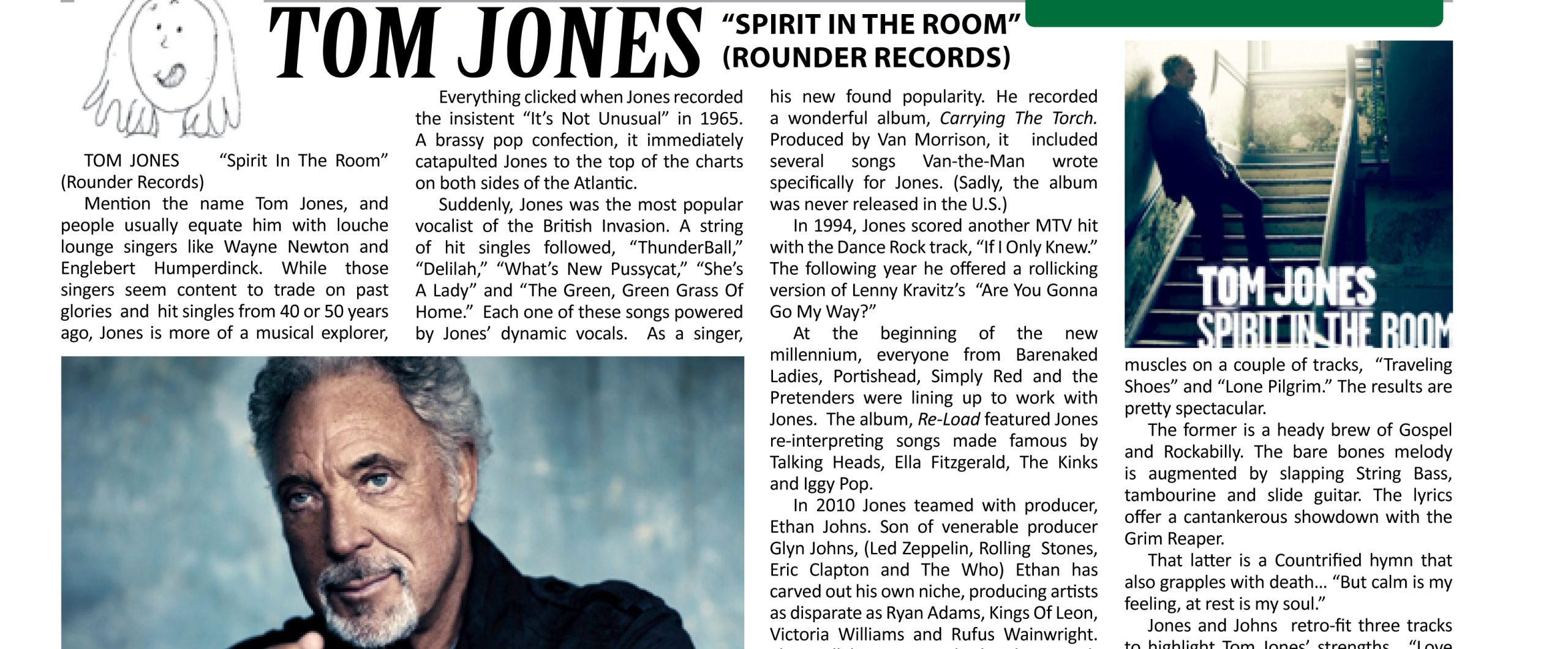
by Eleni P. Austin
Mention the name Tom Jones, and people usually equate him with louche lounge singers like Wayne Newton and Englebert Humperdinck. While those singers seem content to trade on past glories and hit singles from 40 or 50 years ago, Jones is more of a musical explorer, eager to conquer new territories.
Tom Jones was born Thomas John Woodward in Pontypridd, South Wales, England in 1940. At age 12 he battled Tuberculosis. As a teen, he idolized soul belters like Little Richard, Jackie Wilson and Solomon Burke.
By the time he was 17, Jones was married and a father. By the early 60s he began pursuing a career in music gigging in clubs as “Tommy Scott” with his band, The Senators. He recorded a string of singles with innovative producer, Joe Meek, but they went nowhere.
His luck changed when talent agent Gordon Mills caught his act. Hoping to capitalize on the popularity of the 1963 film, Tom Woodward was re-christened Tom Jones.
Everything clicked when Jones recorded the insistent “It’s Not Unusual” in 1965. A brassy pop confection, it immediately catapulted Jones to the top of the charts on both sides of the Atlantic.
Suddenly, Jones was the most popular vocalist of the British Invasion. A string of hit singles followed, “ThunderBall,” “Delilah,” “What’s New Pussycat,” “She’s A Lady” and “The Green, Green Grass Of Home.” Each one of these songs powered by Jones’ dynamic vocals. As a singer, Jones was able to shift effortlessly from a swivel-hipped Don Juan to a warm, introspective crooner.
By the end of the 60s Jones had relocated to Los Angeles to star in his own variety show, “This Is Tom Jones.” The TV program provided a weekly showcase for Jones’ considerable charms. Many a matron sharpened her pitching arm, flinging assorted ladies underthings in Tom Jones’ direction. Thus a legend was born!
When the television show ended in 1971, Jones accepted a lucrative deal playing extended engagements in Las Vegas. Jones was able to pal around with his idol, Elvis Presley, but he neglected his recording career for the remainder of the 70s.
As the new decade dawned, Jones began recording again, but he kind of got trapped in the Country Western genre. Gordon Mills had passed away, and Jones allowed his son, Mark Woodward to manage his career.
As the 80s came to a close, Woodward had steered Jones away from the narrow confines of Country music and paired him with eclectic Electric Dance collective, Art Of Noise.
Their masterful rearrangement of Prince’s song “Kiss” propelled Jones to the Top 10 in the U.S. and the U.K. The innovative video that accompanied the song went into heavy rotation on MTV introducing Jones’ eternal Sex God energy to a whole new generation.
Jones wasted no time capitalizing on his new found popularity. He recorded a wonderful album, Carrying The Torch. Produced by Van Morrison, it included several songs Van-the-Man wrote specifically for Jones. (Sadly, the album was never released in the U.S.)
In 1994, Jones scored another MTV hit with the Dance Rock track, “If I Only Knew.” The following year he offered a rollicking version of Lenny Kravitz’s “Are You Gonna Go My Way?”
At the beginning of the new millennium, everyone from Barenaked Ladies, Portishead, Simply Red and the Pretenders were lining up to work with Jones. The album, Re-Load featured Jones re-interpreting songs made famous by Talking Heads, Ella Fitzgerald, The Kinks and Iggy Pop.
In 2010 Jones teamed with producer, Ethan Johns. Son of venerable producer Glyn Johns, (Led Zeppelin, Rolling Stones, Eric Clapton and The Who) Ethan has carved out his own niche, producing artists as disparate as Ryan Adams, Kings Of Leon, Victoria Williams and Rufus Wainwright. Their collaboration resulted in the Gospel-Soul album, Praise & Blame.
Now the duo have joined forces again to record what looks to be Jones’ most rewarding effort to date, Spirit In The Room.
The album opens with “Tower Of Song.” Written by Leonard Cohen, the tune is a custom fit for Jones, a regal lion in his twilight years… “I was born like this, I had no choice/I was born with the gift of a golden voice/And twenty seven angels from the great beyond, they tied me to the stage right here in the tower of song.”
Thankfully Jones has resisted the Septuagenarian impulse to gussy up Great American Songbook standards. (This means you, Rod Stewart. Stop it!) Instead, Jones and Johns decided to re-interpret songs from Rock’s songwriting aristocracy: Tom Waits, Richard Thompson and Paul McCartney, to name a few.
On “Bad As Me,” written by Tom Waits, Jones adopts Waits’ Carnival Barker growl. The instrumentation feels like wheezy, broken circus music. Sparse accompaniment is provided by a toy drum kit, Tack Piano, Ukulele and a snake-charmer Chamberlain.
Thompson’s “Dimming Of The Day” is an elegant declaration of love… “You pull me like the moon pulls the tide, you know just where I keep my better side.”
Paul McCartney’s “(I Want To ) Come Home” is a surprisingly wistful tune from “the Cute Beatle.” The lyrics are graceful and tender and Jones delivers them with the sagacity of age… “It’s been fun hanging onto the moon, heading into the sun/ But it’s been too long and I want to come home.”
Jones and Johns flex their songwriting muscles on a couple of tracks, “Traveling Shoes” and “Lone Pilgrim.” The results are pretty spectacular.
The former is a heady brew of Gospel and Rockabilly. The bare bones melody is augmented by slapping String Bass, tambourine and slide guitar. The lyrics offer a cantankerous showdown with the Grim Reaper.
That latter is a Countrified hymn that also grapples with death… “But calm is my feeling, at rest is my soul.”
Jones and Johns retro-fit three tracks to highlight Tom Jones’ strengths. “Love And Blessings” is a jaunty yet erudite cut from Paul Simon’s triumphant 2011 album, So Beautiful, So What. Jones and Johns recalibrate the rhythm locking into a tight Jazz/Funk groove. The assured instrumentation, including cowbell, organ and stinging guitar fills, bookend the philosophical lyrics… “Love and blessings, simple kindness/ Ours to hold onto, not to keep.”
As recorded by the Low Anthem, “Charlie Darwin” is a low key alt. country jem. Much like the Rolling Stones did with “You Can’t Always Get What You Want,” Jones and Johns add a an ethereal choir, Stile Antico. The track is transformed from a spare acoustic song into a heavenly beatification.
Finally, Jones sandblasts the hallucinatory crust from “Just Dropped In,” (Kenny Rogers’ 60s hit with the First Edition). The result is a Psychedelic Cha-Cha replete with stuttery, skittering guitar riffs and Jones’ gritty vocals.
Other stand out tracks include the joyful, jangly swagger of Odetta’s “Hit Or Miss,” the sepulchral Delta Blues of Blind Willie Johnson’s “Soul Of A Man,” and “All Blues Hail Mary,” originally recorded by Singer/Songwriter Joe Henry. Anchored by jagged, jazzy piano chords, the lyrics trace the link between the sacred and profane.
The album closes with a sober read of Bob Dylan’s “When The Deal Goes Down.” Modest and heartfelt, restless and spiritual.
Much like Johnny Cash’s American series, Spirit In The Room solidifies Tom Jones’ place in Rock & Roll’s hierarchy. The perennial sex symbol is now a reflective Lion in Winter.










































